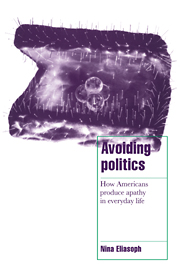Book contents
- Frontmatter
- Contents
- Acknowledgments
- 1 The mysterious shrinking circle of concern
- 2 Volunteers trying to make sense of the world
- 3 “Close to home” and “for the children”: trying really hard not to care
- 4 Humor, nostalgia, and commercial culture in the postmodern public sphere
- 5 Creating ignorance and memorizing facts: how Buffaloes understood politics
- 6 Strenuous disengagement and cynical chic solidarity
- 7 Activists carving out a place in the public sphere for discussion
- 8 Newspapers in the cycle of political evaporation
- 9 The evaporation of politics in the US public sphere
- Appendix 1 Class in the public sphere
- Appendix 2 Method
- Notes
- References
- Index
- Titles in the serious
2 - Volunteers trying to make sense of the world
Published online by Cambridge University Press: 17 November 2009
- Frontmatter
- Contents
- Acknowledgments
- 1 The mysterious shrinking circle of concern
- 2 Volunteers trying to make sense of the world
- 3 “Close to home” and “for the children”: trying really hard not to care
- 4 Humor, nostalgia, and commercial culture in the postmodern public sphere
- 5 Creating ignorance and memorizing facts: how Buffaloes understood politics
- 6 Strenuous disengagement and cynical chic solidarity
- 7 Activists carving out a place in the public sphere for discussion
- 8 Newspapers in the cycle of political evaporation
- 9 The evaporation of politics in the US public sphere
- Appendix 1 Class in the public sphere
- Appendix 2 Method
- Notes
- References
- Index
- Titles in the serious
Summary
The way to get a volunteer is to ask, “Who has a drill bit and can drill eight holes in this board next Saturday?” Someone will come who maybe never volunteered before, and then maybe they'll come again.
Geoffrey, volunteer, telling me how a volunteer group can growPart 1:Trying to hide the public spirit
Volunteers were poised to combat the specter of futility and to convince all newcomers that “You really can make a difference!” and that “Everyone has something to offer,” as they often put it. They hoped to communicate that message through the very act of volunteering; and tried not to pay attention to problems that might undermine that message of hope. So, they tried hard not to care about issues that would require too much talking to solve, and tried to shrink their concerns into tasks that they could define as unpolitical, unconnected to the wider world. These citizens thought they could inspire feelings of empowerment within that small circle of concern; and they implicitly believed that helping people feel empowered was, in itself, doing something good for the community.
Advocates of democracy have long looked to groups that work on small, local issues as potential schools for wider political concern. Volunteers shared faith in this ideal of civic participation, but in practice, paradoxically, maintaining this hope and faith meant curtailing political discussion: members sounded less publicly minded and less politically creative in groups than they sounded individually.
- Type
- Chapter
- Information
- Avoiding PoliticsHow Americans Produce Apathy in Everyday Life, pp. 23 - 63Publisher: Cambridge University PressPrint publication year: 1998



